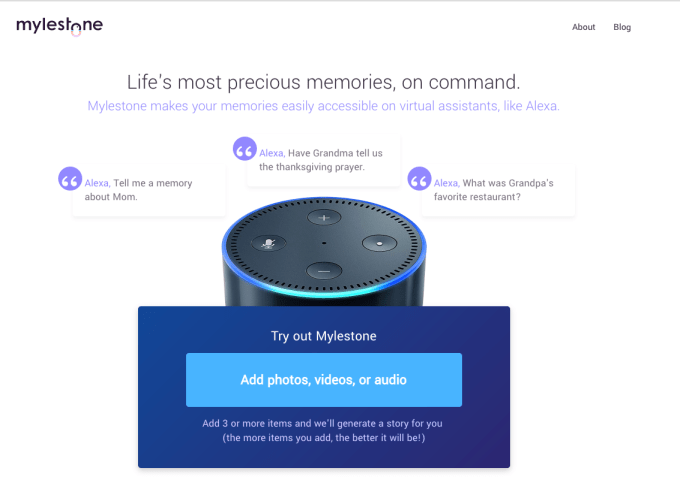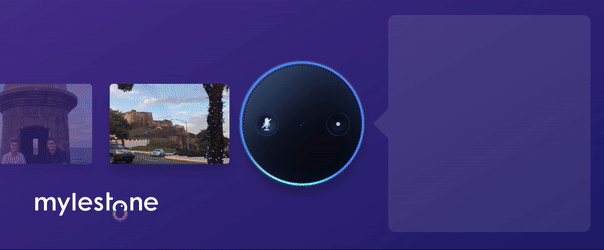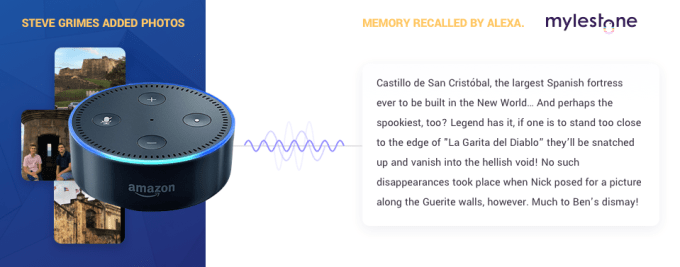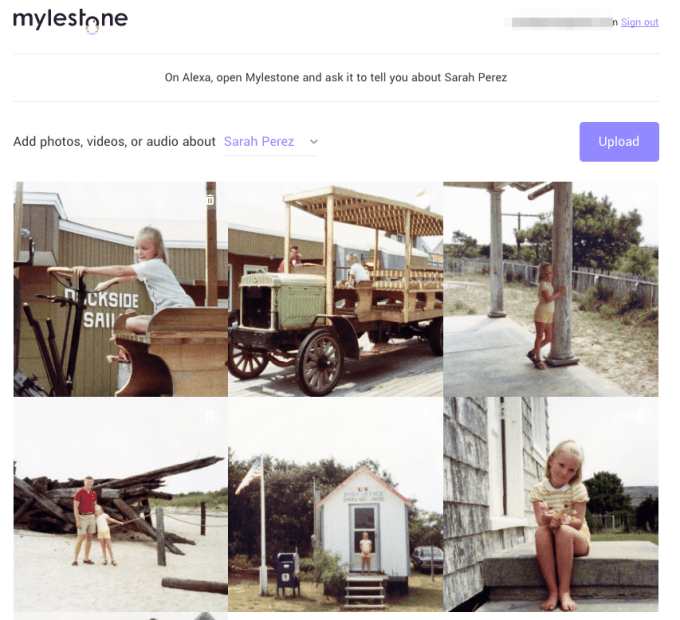
What if our photographs and social media updates could be turned into memories we – or our children – could later access just by asking a virtual assistant, like Amazon’s Alexa? That’s the premise behind a new startup called Mylestone, which is experimenting with turning our digital footprints into narratives that help us recall highlights from our lives, as well as those of our family members and other loved ones.
The idea seems a little far out there, but it’s an area where a number of companies today are competing – whether that’s bots that will remember the minutia of our day-to-day lives, or even tools to augment our human intelligence with computing power.
Mylestone approaches this space a bit differently. Instead of focusing on more utilitarian functions, the startup is developing a highly personal service for capturing and recalling memories.
To use the Alexa app it has created, you first upload a series of photos, videos or audio files to the service. These are then analyzed by a combination of data science – meaning A.I. and machine learning – along with people who help the process along.

So, for example, if you upload a photo of your parents on a vacation, Mylestone’s system can extract certain data automatically. Using metadata from the photo, it can determine things like the date, time or location where the photo was taken. It can also identify certain things in the photo – like a recognizable landmark (think: the Eiffel Tower, e.g.) to make other determinations about what’s in the photograph.
On the human-assisted side of things, people can help connect the other dots to make the sort of leaps that computers cannot (yet). A photo of two elderly people might be your grandparents, for example, the people working with your digital collection could guess. Or maybe the photo is of a restaurant menu – and since other metadata indicates the city where it was shot – people could search until they found the restaurant in question, then manually confirm the related details.
In other words, people can do the sort of advanced cyber stalking you does on ahead of your Tinder dates, but for the purpose of saving life’s precious memories, not digging up dirt.
A future version of the service will also be able to scan your Facebook profile, Instagram, and other social media accounts in order to automatically create these memories for you, without the manual uploads. While that would give Mylestone more access to your personal data, it wouldn’t require any of it to then reside on its servers, as with the file uploads supported today.
“Our intent is to create narratives for you, not to host your content,” explains Mylestone founder and CEO Dave Balter.

Balter previously founded BzzAgent, acquired by Tesco in 2011, and Smarterer, acquired by Pluralsight in 2014. Mylestone’s team includes Head of Engineering Jim Myers who worked with Balter at Smarterer, and Head of Advocacy Jon O’Toole, who co-founded BzzAgent.
A serial entrepreneur and frequent traveler, Balter began thinking about memorials after seeing an empty cemetery when looking out the window of his flight to Laguardia.
After 20 or so trips where he would glance down the graveyard and always find it vacant, a question began to tickle in his mind. Why don’t people go to graveyards anymore?
In part, the answer is that we’re a more transient society these days.
“But what started becoming obvious was that there was something bigger happening. Social [media] had transformed the way we talk about deceased loved ones…it’s fully acceptable to talk about death,” says Balter, noting how we tend to just post on Facebook. “We have other ways to memorialize,” he adds.
But Facebook may not be the best way to do this. And with the rise of voice-based computing, Balter began to think of different ways we could use computers to recall memories. Maybe we could just ask Alexa, he thought.

The Alexa skill lets you say things like: “tell me a story about mom,” or “have grandma say the prayer,” for example. It’s a way of remembering loved ones in a very real, interactive way.
And yes, this is science fiction come to life. Remember this episode of Black Mirror? Or this Sundance film, perhaps?
The startup already has its tendrils in tools for memory collection. It acquired the photo-scanning app Heirloom in April, 2016, for example. And it’s working on other ways to make it easier for families to collect their histories – like tools for collecting grandpa’s war stories, for example – instead of relying only on file uploads.

I tried the service for myself, and found it intriguing. I uploaded a handful of scanned photos from a vacation I took as a child, and Alexa told me a story about my summer on the Outer Banks of North Carolina, visiting the historic and tiny Salvo Post Office, splashing in the ocean, and picking flowers for mom. (Nah, I picked them for me.)
But as a proof-of-concept, it’s not bad. With more data pouring in from Facebook and your social media accounts, and flashing up related imagery on your TV through Alexa’s Fire TV connection (well…one day), Mylestone could be even better.
“This is one of those swing-for-the-fences type of ideas,” said David Frankel, Partner at Founder Collective. “Mylestone is tapping into the mainstreaming of voice activated assistants to put tech-enabled human connection and memory at the center of consumer experience.”
The startup has time to experiment, thanks to a new $2.5 million round of funding led by True Ventures, a prior investor in Smarterer. Also participating are Founder Collective, Boston Seed Capital, Converge Ventures, and Mergelane. To date, Mylestone has raised $4.5 million.
You can try it for yourself here.